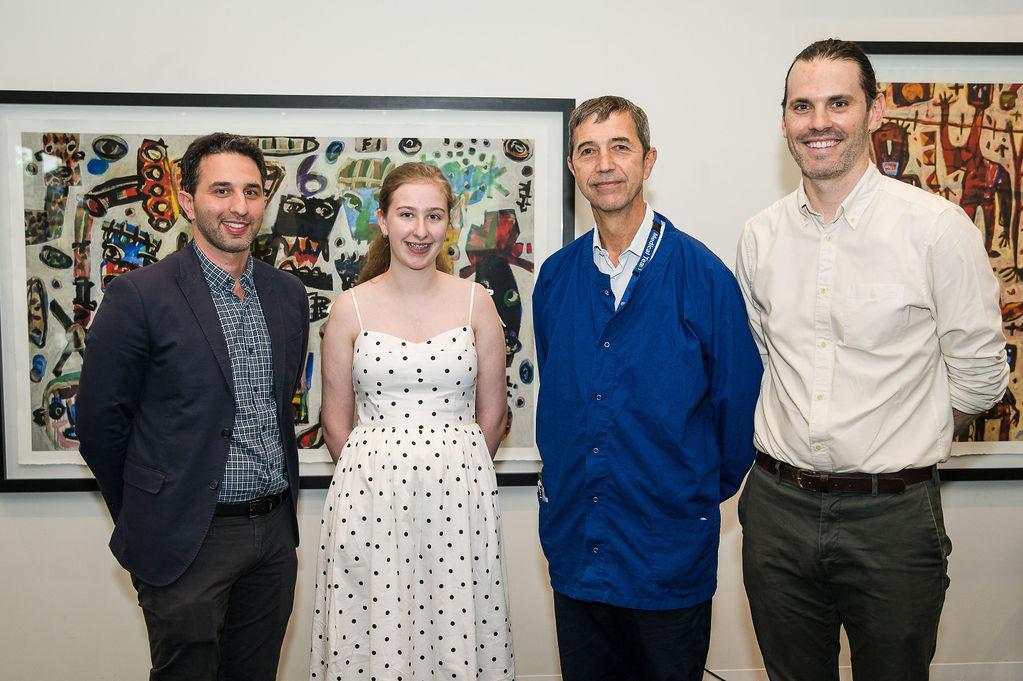
Philanthropic Funds Impact Report 2023
Supporting life-changing research for children around the world.
Scan to view a heartfelt thank you from us all at MCRI


 Professor Kathryn North AC Director, Murdoch Children’s Research Institute
Professor Kathryn North AC Director, Murdoch Children’s Research Institute
Murdoch Children’s Research Institute acknowledges the Wurundjeri people as the Traditional Owners of the land on which MCRI is located. We pay our respects to their Elders, past and present.
3 Philanthropic Funds Impact Report 2023 2 Murdoch Children’s Research Institute
Our
purpose is to give all children the opportunity to live a healthy and fulfilled life.
When our children are sick, we take for granted that doctors and nurses know how to make them feel better.
It’s scientific discoveries, made through MCRI and generously supported by our donor and corporate community, that help change what is possible in child health. Medical breakthroughs made at MCRI save the lives of children all over the the world, helping them to lead healthier and more fulfilled lives.
One of the top three child health research institutes worldwide for research quality and impact.*

1,630 research partners and 10,759 collaborations across 105 countries
1,800+ world-leading researchers working across more than 150 diseases. World-class facilities, laboratories, and research equipment unlocking new frontiers of discovery and innovation.
Located within a globally renowned biomedical precinct of 48,000+ employees and 40+ biomedical organisations in Melbourne.
*Clarivate Performance analysis and MCRI benchmarking report, November 2023
Murdoch Children’s
Research
Institute, based within The Royal Children’s Hospital in Melbourne Victoria
Photo Credit: John Gollings
5 Philanthropic Funds Impact Report 2023 4 Murdoch Children’s Research Institute
Philanthropic Funds
Whether you responded to one of our appeals, or joined us as a corporate supporter, your investment in MCRI’s Philanthropic Funds has supported research that improves the lives of millions of children.
By combining forces with like-minded supporters, you are making an even greater difference to advancing critical research that brings benefit to children, families, and their communities.
Our four Philanthropic Funds support some of our key activities within the Institute. The Brilliant Minds Fund supports our most promising leaders, the Discovery Fund some of our best ideas, the Innovation Fund an opportunity to make a difference to our communities, and the Future Fund for the long-term endowment.

Brilliant Minds Fund
Support the career of a talented researcher and make one of the most valuable investments that can be made for the Institute, individual researchers, and the field of child health research.

Innovation Fund
Fund projects with the greatest potential to deliver real world outcomes. Our innovative research can be converted into life-changing improvements in the communities in which children live, learn and grow.

Discovery Fund
Invest in promising projects and play a role in accelerating groundbreaking discoveries in medical research by providing seed funding for one-of-a-kind, proof-of-concept projects that show huge potential

Future Fund
Support future generations of children by contributing to the long-term endowment of Murdoch Children’s Research Institute.

“By working with others, I know that my contribution is valuable and can have even greater impact.”
Philanthropic Funds Donor
 Image above: Proliferation (blue) of heart muscle cells (red) in a stem cell derived 2D cardiac model.
Image above: Proliferation (blue) of heart muscle cells (red) in a stem cell derived 2D cardiac model.
6 7 Murdoch Children’s Research Institute Philanthropic Funds Impact Report 2023
Photo Credit: Dr Frankie Butera and Rachel Morris (Heart Regeneration Group – Prof Enzo Porrello and A/Prof David Elliott).

Brilliant Minds
In 2023, the Brilliant Minds Fund invested in exceptional researchers who are dedicated to improving health outcomes for children.
Meet Professor Enzo Porrello
Professor Porrello has a passion for tackling heart disease, the most common birth abnormality in children and leading cause of infant death in Australia.
His laboratory has already created heart tissue from stem cells and is now looking at personalised treatments made from a child’s own stem cells.
I lead a team of researchers trying to understand and develop new therapies for heart disease in children. These include conditions that children are born with which affect the structure or function of the heart, as well as acquired forms that develop later in life. The most advanced form of heart disease is known as heart failure, which is where the heart is not able to perform its primary function of pumping blood around the body. We are developing regenerative therapies that can replenish heart muscle cells and functionally recover the failing heart.
Our laboratory has developed technologies that allow us to grow human heart tissue from stem cells. We are using these human stem cell-derived heart tissues to understand the causes of childhood heart disease, to test new therapies and as potential cellular therapies to replenish
heart muscle cells in the failing heart. In collaboration with bioengineers, cardiac surgeons, cardiologists, industry partners and patient advocates, we are currently undertaking critical preclinical studies to evaluate the safety and effectiveness of these novel therapies that have the potential to transform the treatment of heart failure. The ultimate goal of our research is to improve the lives of patients with childhood heart disease. We hope to achieve this through our stem cell modelling, drug development and cellular therapy programs.
Our team would like to thank all the incredible supporters for their generosity in providing us with the opportunity to undertake this research. We are acutely aware of the transformative impact it could have on patients and their families.

“The research that MCRI is doing is so important for all the generations to come because it could save lives.”
- Mia Cowley, Patient Advocacy Group Adolescent Representative

View stories about the lifelong impact these conditions have on patients and their families, and the hope offered by our research.
Image below:
Professor Enzo Porrello, Mia Cowley, Professor Christian Brizard and Dr Adam Piers
8 9 Murdoch Children’s Research Institute Philanthropic Funds Impact Report 2023

MCRI’s Victorian Infant Collaborative Study (VICS), globally the longest running research program focused on studying the outcomes following extremely preterm birth.
As a neonatologist I look after some of the sickest newborn babies, and I have dedicated over 25 years to improving the longterm outcomes of high-risk infants, especially those born preterm or with extremely low birth weight. Despite medical advancements enabling more preterm babies to survive, many still face significant health and developmental issues that persist throughout their lives.
VICS leads the world in advancing knowledge on the long-term outcomes of the tiniest and most immature babies who survive into their families.
Our research includes vital follow up assessments of pre-term babies, with the long-term goal of providing the best possible care to improve outcomes for these children and their families.
Such understanding is critical to inform families of what to expect when their babies grow up, provide knowledge to design health and developmental follow up programs, and underpin developments of new treatments to improve health and development.
Later this year, participants from our latest VICS cohort of births in 2022 and 2023 will start turning two years of age and we will be seeing them again to assess their development, as well as their parents’ mental health and quality of life. This research will help us
better understand how we can continue to support families and further explore early interventions with collaborators that will ultimately enhance outcomes for preterm infants.
It is my honour to head up the program and be invited to share our research at conferences worldwide. I am also immensely proud that in December 2023 the VICS program received recognition with an award for Interdisciplinary Research from the University of Melbourne.
The VICS participants and their families are deeply grateful to all MCRI supporters. Thanks to the ongoing support from the MCRI community, we can make a meaningful impact and continue to deliver world-class research to improve the health outcomes for babies born preterm and their families.
“Being approached to join the VICS study for our preterm adventurer, Claire, felt like receiving an exclusive invite to the beta version of the parenting game.
Participating in this study is like navigating not-so-secret bonus levels, where we get to better understand the unique challenges and mysteries of Claire’s preterm development. It’s an exciting adventure, and as parents, we’re thrilled to be part of this quest for scientific knowledge, all while feeling like early adopters in the world of parenting.”
–Baby Claire and her Mother, VICS participants

Image below: Baby Claire and her Mother, VICS participants 11 Philanthropic Funds Impact Report 2023 10 Murdoch Children’s Research Institute

Meet Professor Andrew Steer
Professor Steer is recognised as an international leader in neglected tropical disease research with a focus on public health efforts to control conditions like scabies, rheumatic heart disease and Strep A.
I am dedicated to advancing research and interventions in tropical infectious diseases to improve global health outcomes. Alongside my work as a paediatric infectious disease physician, I am deeply involved in global health research and proud to be the Group Leader of Tropical Diseases at MCRI and Director of the World Scabies Program. Our team’s research is far reaching and made possible through generous philanthropic support.
In my career, I have worked to elevate the importance of
addressing scabies as a global health concern. Over two decades of research have brought us to the point where we can begin to imagine we may eliminate scabies as a public health problem in individual countries. Our long and productive research collaboration with Fiji and Solomon Islands is one I am particular proud of.
Pacific island countries have among the highest prevalence of scabies reported in the world. Scabies is an entirely preventable disease that disproportionately affects children and families in overcrowded and impoverished living condition. Scabies disrupts family life, impedes educational outcomes, and adds unnecessary burden to a stretched healthcare system.
In partnership with the Ministries of Health in Fiji and Solomon Islands, we are leading a program to eliminate scabies. Following several trials led by MCRI and key collaborators in these countries over the last decade,
we have found that mass drug administration of ivermectin can reduces scabies prevalence by over 90%. Ivermectin is widely used, safe, and is available in tablet form that can be easily administered by community health workers in rural and remote areas.
The program has successfully commenced with a first round of distribution of ivermectin to the entire population of Fiji and Solomon Islands. We are planning a second round in Solomon Islands in 2024. Additionally, we are focusing our efforts in both countries on strengthening health systems to enable surveillance, ongoing health promotion and disease management.
These health outcomes are as a direct result of evidencebased research, strong global collaborations and the coming together of our supporters to fund these large-scale projects. We are indebted to everyone who generously supports our work.
Scabies is the third most common neglected tropical disease with an estimated 455 million cases of scabies every year. It affects 14.5% of Fijian children aged less than 10 years, and untreated can lead to life-threatening complications such as severe skin and bloodstream infections, and kidney and heart disease.

13 Philanthropic Funds Impact Report 2023 12 Murdoch Children’s Research Institute
Discovery
In 2023, the Discovery Fund supported some of our most promising research projects and pilot studies that have great potential for groundbreaking discoveries in medical research.
Life-saving vaccine development
to healthcare systems around the world. This problem is further exacerbated by the lack of new and innovative treatment options currently under development.

I work in the area of antimicrobial resistance (AMR). AMR arises when disease causing microorganisms are no longer responsive to existing treatments. Of these, bacterial AMR is the most common type and has emerged as a critical challenge
My research interrogates the intimate interactions between the host (us) and the pathogen (drugresistant superbugs). This helps to identify novel therapeutic targets for the design and validation of innovative treatment options. I am grateful to the Discovery Fund for supporting a very exciting project for the treatment of gastritis – a condition where the lining of the stomach becomes inflamed or irritated.
Helicobacter pylori is a primary cause of bacterial gastritis and has been identified by the World Health Organisation as a priority pathogen for which new drug discovery is urgently required. More than half the world’s population carries these bacteria which are typically acquired very early on in childhood. Most people spend their entire lives without knowing that they have these bacteria. But in around one-fifth of those infected, H. pylori can cause chronic gastritis and stomach ulcers. If not

Image bottom left: Healthy stomach tissue architecture (blue and red) showing expression of a host protein (green).
Photo Credit: Dr Sohinee Sarkar and Serene Yeow.
treated successfully (increasingly a problem due to antibiotic resistance), this can progress into stomach cancer later in life.
Stomach cancer is currently the fourth leading cause of cancerrelated deaths.
Our team at MCRI has developed a patented vaccine technology against H. pylori with a completely new mechanism of action. As the road to getting a new vaccine approved for widespread use is long and fraught with many hurdles, I am also developing a new therapy based on our knowhow from the vaccine studies.
I would like to take this opportunity to sincerely thank our generous donors, this support has helped with my transition from an early career researcher to a project lead and enabled me to continue working on the projects that I am passionate about. I have been able to establish a collaboration with international researchers that will accelerate the progression of this valuable research. Thank you.
New approaches to understanding

Leader and Senior Research Fellow in the Muscle Research group at the MCRI.
My research focuses on skeletal muscle which is the largest organ of the human body and accounts for over 40% of our total body mass. I study the spectrum of muscle conditions, from trying to understand what makes an athlete, to working with children who are affected by devastating genetic muscle diseases.
swallowing. The burden of genetic muscle diseases is incredibly high. Unfortunately, there are currently very few treatments or approved therapies that have been approved to treat these diseases.
Our ambitious project proposes a paradigm shift in how we model and develop treatments for patients with muscle disease. By using muscle cultures grown from the patient’s own cells, this novel approach will provide a significant leap forward in the study of genetic muscle diseases.
This program will provide better models and detailed information to understand how these diseases work. It will enable the identification of novel drug targets and establish models to test gene therapies on living organisms. Furthermore, as additional patients engage with the research, it will allow for rapid modelling of new disease genes and identification of new disease mechanisms into the future.
Ultimately, through this novel way of studying muscle diseases, both in the laboratory and in living organisms, it will enable the development of new life-changing treatments.

“I realised that there was hope for George…with research progressing along its promising trajectory, there may be more that could be offered to him than supportive therapies and mobility aids. I can’t adequately explain what a difference that realisation made at the darkest time in our lives.”
- Mother of Australian muscle disease patient and member of our consumer reference group.
The World Health Organisation (WHO) recognises bacterial AMR as one of the top global public health and development threats, contributing to nearly five million deaths every year.
Genetic muscle diseases are a diverse group of conditions that present with a wide spectrum of severity. All typically result in significant morbidity due to loss of muscle function, reduced mobility and difficulty breathing and
I am very grateful for the ongoing support that we have received for our research, and I would like to personally thank those who have contributed to MCRI’s Philanthropic Funds. From the donations and gifts that my team have received we are able to keep progressing our research as we continue to develop new approaches to treating this group of devastating muscle disorders.
Dr Sohinee Sarkar is a senior postdoctoral fellow in the Global Health, Infection and Immunity Theme at MCRI.
Image
top right: Genetic muscle disease patient
15 Philanthropic Funds Impact Report 2023 14 Murdoch Children’s Research Institute
Innovation
In 2023, the Innovation Fund helped to kick-start research projects at the cusp of translation, allowing our experts to complete essential pre-clinical trial testing of novel therapeutics or interventions, and facilitate community implementation and policy reform.
Advancing equity for all children
For 30 years, MCRI’s Centre for Community Child Health (CCCH) has been committed to achieving equitable and real-life improvements in children’s health, development, and wellbeing.
Inequities emerge well before a child begins school. Currently, one in five children begin primary school developmentally vulnerable, lacking the experiences or environments they need because of preventable social, economic, or geographic circumstances.
To address the rising and inequitable rates of child developmental and behavioural issues we need a broad range of professionals across health, education, and social care to be engaged and skilled for early identification and intervention.
The Innovation Fund is investing in an exciting initiative at CCCH to develop a sustainable mechanism for translating research and evidence into national training and development for 900,000 Australian professionals who work with children and families. Investing in these opportunities is crucial for fostering evidencebased decision-making, driving innovation, and ensuring the
continual improvement of workforce skills and competencies on a national scale.
The team have already gathered insights from professionals across all key areas and identified a strong need and interest in the type of training and development that CCCH can deliver. We are now exploring and testing various digital platforms to roll out the program and investigating ways to ensure its sustainability and achieve the biggest impact. The team is paving the way for other areas of research across MCRI that wish to implement training and development to support their research translation efforts and maximise their impact.
By bringing together experts in child health, development, behaviour, and wellbeing, and building effective partnerships with children and families, this innovative project will ultimately drive improvements to the lives of all children regardless of their circumstances.
“Delivering our research and evidence directly to the professionals working with children and families offers a swift path to impact. We are deeply appreciative of the innovation fund, as it has enabled us to validate demand for our existing training and development offerings and set a pathway toward a highly desirable program that is sustainable, feasible and viable.”
-Professor Sharon Goldfeld, Director, Centre for Community Child Health (CCCH)


below: Training
led by the CCCH team 17 Philanthropic Funds Impact Report 2023 16 Murdoch Children’s Research Institute
Image
session
Thank you to our 2023 Philanthropic Funds Supporters
Antoinette Albert
Andrew Alston
The Andrews Family Trust
Charitable Fund
Balcon Group
Maureen Barden
Andrew and Natalie Bassat
Janet Bell
BioTools Pty Ltd
Garry Bromham
Bill and Sandra Burdett
The Calvert-Jones Family
Sandra Clark
Ronda and Ernest Clarke
Trevor S Cohen AM and Heather Cohen
June Danks
Gerry Davies and Jessica Mariani
Charles Day and Elise Everest
Annette Domanti
Joan Fell
John and Gaye Gaylard
Sonia Gilderdale
Gourlay Charitable Trust
Gras Foundation Trust
Maurice Hall
Geoffrey E Heeley
Heather Henderson
Raymond Hemphill
Tim Hovey
The Isabel & John Gilbertson Trust
Dean Koutsoumidis
James Linton
Judy A Matear
Christine and Denis McConnell
Doug McIver
The McKenzie Family
The McPhee Charitable Fund
Mark Montag
Diana Morgan AM
Naranda Meadows Pty Ltd
Philip Myles Neri
Dorothea Nossbaum
The Orloff Family Charitable
Trust Judy Roach, Richard Roach and Sally Gough
Judith Robinson
Michael and Rita Shearer
Anne and Bernie Shinners
Colin and Jan Smith
Trish Spencer
Grant and Terri Stephenson
Rosemary Stipanov
Stocks Family Foundation
Robert and Laura Stone
The Sunraysia Foundation
Robin Syme
Mary Tallis
Judith Theobald
Vanguard Workplace Giving
W V James and Son
The Walt Disney Company (Australia) Pty Ltd
Phillip Weston, in memory of Julie Weston
John and Irene Williams
Elane Zelcer Anonymous (3)
Donations received of AU$1,000 or more.
With heartfelt appreciation, we thank the following for their thoughtful and generous bequests.
Estate of William Gordon Angus
Estate of Margaret Jean Bertuch
Estate of Lorna Bertha Darbyshire
Margaret and John Houston,
Yarra Glen
Corporate Supporters







18 19 Murdoch Children’s Research Institute Philanthropic Funds Impact Report 2023
Together, we can shape the future
Through collective giving, we can continue to invest in up-and-coming researchers and their projects, to ultimately improve the prediction, prevention, diagnosis, and treatment of disease in children.
Thank you for contributing to MCRI’s Philanthropic Funds and helping us make an even greater difference to the health of children in Australia and globally.
Donate today

For more information
To discuss MCRI’s Philanthropic Funds and support research that improves the lives of millions of children each year, please contact:
Engagement and Philanthropy
E philanthropy@mcri.edu.au T +61 3 9936 6362
Murdoch Children’s Research Institute
The Royal Children’s Hospital 50 Flemington Road, Parkville Victoria, 3052 Australia mcri.edu.au
20 Murdoch Children’s Research Institute



 Professor Kathryn North AC Director, Murdoch Children’s Research Institute
Professor Kathryn North AC Director, Murdoch Children’s Research Institute







 Image above: Proliferation (blue) of heart muscle cells (red) in a stem cell derived 2D cardiac model.
Image above: Proliferation (blue) of heart muscle cells (red) in a stem cell derived 2D cardiac model.




















